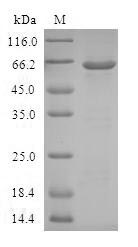Human AKR1C4 Recombinant Protein Product Attributes
Product Type: Recombinant Protein
Recombinant AKR1C4 based upon sequence from Human
Host: QP5639 protein expressed in E. coli.
Tag: GST
Protein Construction: A DNA sequence encoding the Homo sapiens (Human) AKR1C4, was expressed in the hosts and tags indicated. Please select your host/tag option, above.
Recommended Applications: Immunogen, Protein Standard, Cell culture, or Other Cell Biology Applications.
Application Notes: Please contact us for application specific information for QP5639.
Bioactivity Data: Untested
Full Length? Full Length
Amino Acid Sequence: MDPKYQRVEL NDGHFMPVLG FGTYAPPEVP RNRAVEVTKL AIEAGFRHID SAYLYNNEEQ VGLAIRSKIA DGSVKREDIF YTSKLWCTFF QPQMVQPALE SSLKKLQLDY VDLYLLHFPM ALKPGETPLP KDENGKVIFD TVDLSATWEV MEKCKDAGLA KSIGVSNFNC RQLEMILNKP GLKYKPVCNQ VECHPYLNQS KLLDFCKSKD IVLVAHSALG TQRHKLWVDP NSPVLLEDPV LCALAKKHKQ TPALIALRYQ LQRGVVVLAK SYNEQRIREN IQVFEFQLTS EDMKVLDGLN RNYRYVVMDF LMDHPDYPFS DEY
Purity: Greater than 80% as determined by SDS-PAGE.
Reconstitution Instructions: Concentrated protein in liquid format. Reconstitution is not necessary.
Concentration of Human AKR1C4 Protein:
Endotoxin Levels: Not determined.
Buffer: Tris-based buffer, 50% glycerol
Storage Conditions: Store at -20C to -80C.
| Recombinant Human AKR1C4 Protein General Information | |
|---|---|
| Alternate Names | |
| AKR1C4, CDR, DD4, CHDR, 3-alpha-HSD, C11, HAKRA, DD-4 | |
| Curated Database and Bioinformatic Data | |
| Gene Symbol | AKR1C4 |
| Entrez Gene ID | 1109 |
| Ensemble Gene ID | ENSG00000198610 |
| RefSeq Protein Accession(s) | NP_001809.3 |
| RefSeq mRNA Accession(s) | NM_001818.3 |
| UniProt ID(s) | P17516 |
| UniGene ID(s) | Hs.567245 |
| HGNC ID(s) | HGNC:387 |
| COSMIC ID Link(s) | AKR1C4 |
| KEGG Gene ID(s) | hsa:1109 |
| PharmGKB ID(s) | PA24680 |
| General Description of Recombinant Human AKR1C4 Protein. | |
| Catalyzes the transformation of the potent androgen dihydrotestosterone (DHT) into the less active form, 5-alpha-androstan-3-alpha,17-beta-diol (3-alpha-diol). Also has some 20-alpha-hydroxysteroid dehydrogenase activity. The biotransformation of the pesticide chlordecone (kepone) to its corresponding alcohol leads to increased biliary excretion of the pesticide and concomitant reduction of its neurotoxicity since bile is the major excretory route. | |
Limitations and Performance Guarantee
This is a life science research product (for Research Use Only). This product is guaranteed to work for a period of two years when stored at -70C or colder, and one year when aliquoted and stored at -20C.




There are no reviews yet.